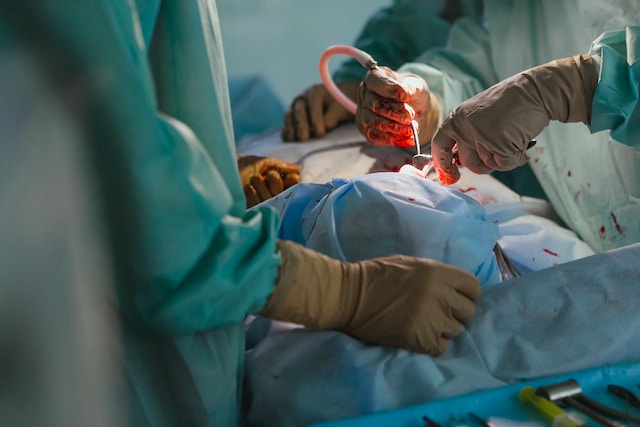Oesophageal cancer is a formidable adversary, known for its aggressive nature and challenging treatment options. Surgical intervention plays a pivotal role in the management of oesophageal cancer, but patients and their families often have questions about the success rate of such surgeries. This article aims to shed light on the success rates of surgery for oesophageal cancer and the key factors that influence these outcomes.
Understanding Oesophageal Cancer
Before delving into success rates, it's essential to have a basic understanding of oesophageal cancer. The oesophagus is a muscular tube that connects the throat to the stomach, allowing food and liquids to pass into the digestive system. Oesophageal cancer occurs when malignant cells develop in the lining of the oesophagus.
There are two primary types of oesophageal cancer: squamous cell carcinoma and adenocarcinoma. Squamous cell carcinoma typically arises in the upper or middle part of the oesophagus, while adenocarcinoma typically occurs in the lower oesophagus, near the junction with the stomach.
Oesophageal cancer is often diagnosed at an advanced stage due to its subtle early symptoms. This late-stage diagnosis can complicate treatment options, making surgery a critical component of the therapeutic approach.
Success Rate of Oesophageal Cancer Surgery
The success rate of oesophageal cancer surgery, often referred to as the surgical outcome, can vary widely based on several factors. It is essential to recognize that success can be measured in different ways, including:
-
Overall Survival: The most critical measure of success is the patient's overall survival, which refers to the number of patients who survive a certain period after surgery. The five-year survival rate is commonly used in cancer prognosis.
-
Disease-Free Survival: This metric assesses how long a patient remains cancer-free after surgery.
-
Quality of Life: Success also includes the patient's ability to maintain a reasonable quality of life after the surgery, considering factors like eating, drinking, and overall well-being.
Factors Influencing Success Rates
Several factors can significantly influence the success rates of surgery for oesophageal cancer:
-
Cancer Stage: The stage at which oesophageal cancer is diagnosed is a critical determinant of surgical success. Early-stage cancers are generally associated with higher success rates, while advanced-stage cancers pose greater challenges.
-
Tumor Location: The location of the tumour within the oesophagus can impact the complexity of surgery. Tumours in the upper part of the oesophagus can be more challenging to treat surgically.
-
Patient's General Health: A patient's overall health and fitness level play a crucial role in surgical outcomes. Patients with significant comorbidities may have a higher risk of complications.
-
Surgical Expertise: The experience and skill of the surgical team performing the operation are vital. High-volume centres with experienced surgeons tend to achieve better outcomes.
-
Type of Surgery: There are different surgical approaches for oesophageal cancer, including oesophagectomy (removing a portion of the oesophagus) and gastrectomy (removing a portion of the stomach). The type of surgery selected can influence success rates.
-
Response to Neoadjuvant Therapy: Some patients receive neoadjuvant therapy (chemotherapy or radiation before surgery) to shrink the tumour. A favourable response to this therapy can improve surgical outcomes.
-
Post-Surgery Complications: Surgical complications, such as infection, leakage at the surgical site, or anastomotic strictures, can affect the success rate and recovery process.
-
Follow-Up Care: Ongoing follow-up care, including surveillance for recurrence and rehabilitation, plays a role in long-term success.
It's important to note that while surgical outcomes for oesophageal cancer can be influenced by these factors, every patient's situation is unique. Success rates can vary significantly from one individual to another.
Improvements in Surgical Techniques
Advancements in surgical techniques have also contributed to better outcomes for oesophageal cancer patients. Minimally invasive approaches, such as laparoscopic and robotic-assisted surgery, have reduced the invasiveness of procedures, resulting in shorter hospital stays and quicker recoveries for some patients.
Enhanced perioperative care, including nutritional support and specialized post-operative monitoring, has also improved patient outcomes.
Balancing Risks and Benefits
It's crucial to understand that surgery for oesophageal cancer, like any major procedure, carries risks. Patients and their healthcare teams must carefully weigh the potential benefits of surgery against these risks. In some cases, surgery may not be recommended if the risks outweigh the potential benefits, particularly in patients with advanced-stage cancer or significant health issues.
Conclusion
In conclusion, the success rates of surgery for oesophageal cancer are influenced by a complex interplay of factors, including cancer stage, patient health, surgical expertise, and treatment approaches. While advancements in surgical techniques and perioperative care have improved outcomes, oesophageal cancer remains a formidable challenge. Patients should engage in informed discussions with their healthcare providers to make the best decisions tailored to their unique circumstances. Additionally, ongoing research and innovations in cancer treatment, including the management of gastrointestinal stromal tumours, hold promise for further enhancing the success rates and quality of life for individuals confronting oesophageal cancer.


No comments yet